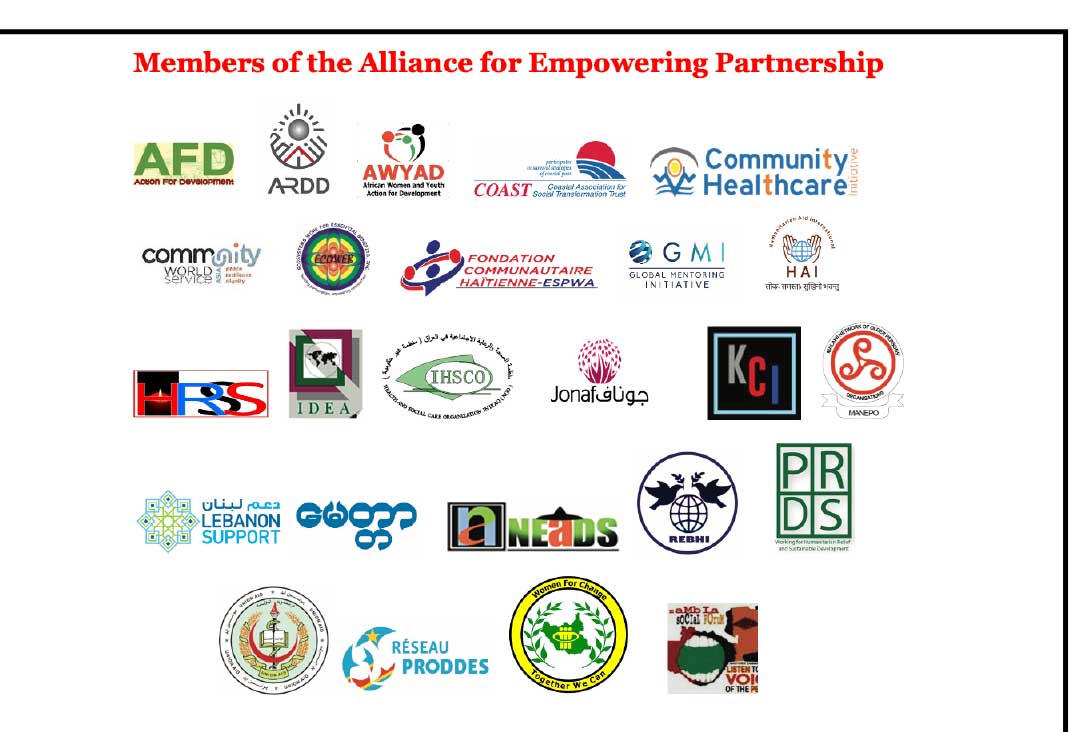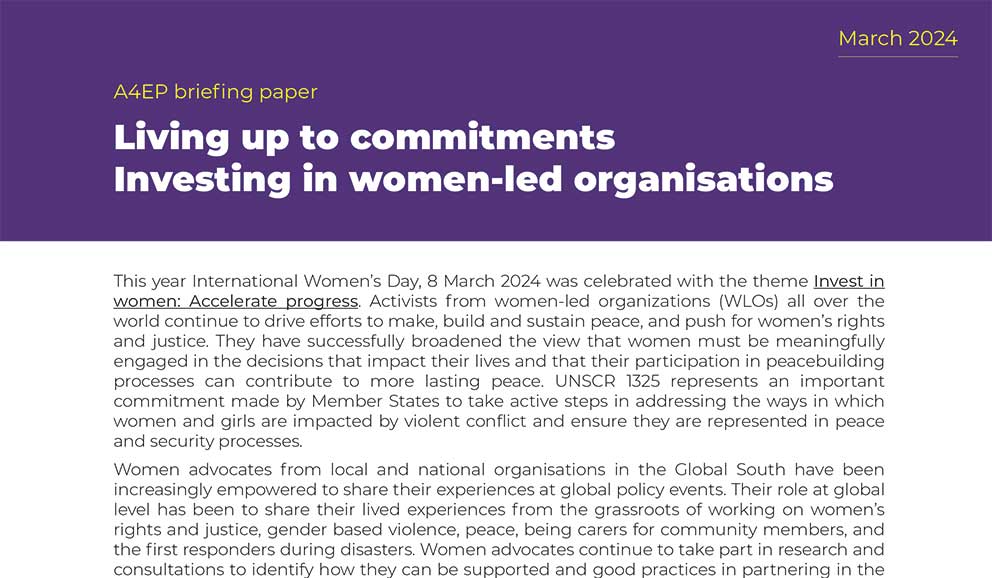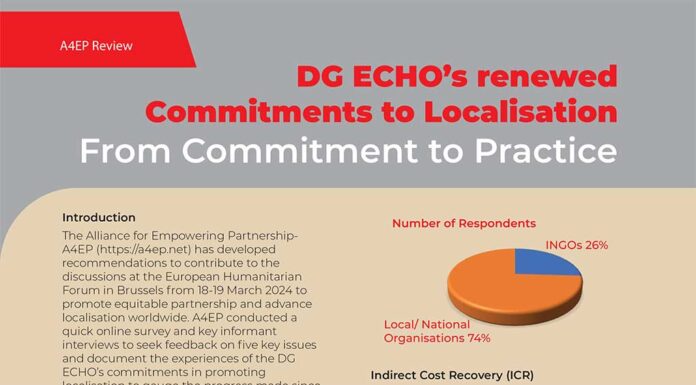Alliance for Empowering Partnership(A4EP) is a network of independent and locally grown civil society organisations in the global south and global activist practitioners advocating to transform aid architecture based on community realities. Members and their networks from 19 countries in Aisa, Africa and Middle East are leading voices and play a leading role in relief, humanitarian and development assistance. They work together to provide a platform for information dissemination, sharing experiences, evidence, good practice and learning. Initiate advocacy strategies in their countries, where possible, contribute to on-going research and debates, and develop consulted and commonly agreed positions and advocacy strategies around the global agenda of Localisation, Participation Revolution, Tansparency and Accountability.
Since becoming a signatory of the Grand Bargain in September 2020, A4EP has been actively championing the inclusion of diverse local actors in the decision-making processes and governance structures of the Grand Bargain. Our commitment to amplifying local perspectives and voices has been evident through our participation in workstreams, caucuses and Global South constituency consultations, and our role, as Facilitation Group member from 2022 to 2023, in negotiating and shaping the text for the Grand Bargain beyond 2023. We have consistently emphasized the importance of national-level implementation and the integration of the nexus approach and a longer term vision to address humanitarian needs. See our paper Shrink The Needs – a Grander Bargain no longer an option but a necessity.
During the planning of the 2023 annual meeting, we negotiated for increased representation and voice for local actors, advocating for the inclusion of more local actors, even as observers. As we approach the 10th anniversary of the Grand Bargain, we recognize the need for a tangible shift from policy rhetoric to scaled action. Through our experiences and engagement, we have seen the value of the Grand Bargain process. First, we have witnessed encouraging progress in global policy formulation and guidance, with some donors taking steps towards localization through addressing their own internal blockages. Second, the establishment of caucuses focusing on Cash, Role of Intermediaries, Quality Funding, and Localization has generated momentum in overcoming higher political barriers towards achieving tangible outcomes. Moreover, global spaces that facilitated the participation of local actors in discussions, surveys, and consultations have provided opportunities for contributions to shape the Grand Bargain and humanitarian policies.
However, it is insufficient to merely take part in discussions if the views and perspectives of local actors are not genuinely considered in decision making processes due to power imbalances. Often, local actors find themselves outnumbered by international actors in the decision-making processes both at country and international levels. We will continue to challenge the power structures and speak truth to power.
Those local actors who take on coordination and/or representation roles need to invest their own time and resources without being adequately supported or resourced. We call for the establishment of a funding facility, accessible to local actors, so they can execute their roles responsibly, effectively and with dignity.
To bridge the gap between global commitments and local realities, greater attention must be given to country-level processes for translating policies and discussions into actions. With only three years remaining until the 10th year commemoration of the Grand Bargain, it is imperative that we expedite progress from ad hoc pilot projects to scale up commitments to practical and consistent implementation at the country level. A4EP will work with the Ambassadors, the Facilitation Group and other signatories to ensure implementation of the commitments.
A4EP commitments
- We commit to raising awareness of the priorities of the Grand Bargain beyond 2023 and mentor local actors to engage actively in promoting local-level engagement through collaboration with other stakeholders at the country and international levels.
- We will consistently advocate for inclusive decision-making processes, ensuring that local actors and communities have a voice in both global and national decision-making processes. A4EP members will work with other signatories to assist in organising country level engagement with the GB Ambassadors and will continue to foster safe and regular engagement between local/national actors, institutional donors and funding partners, providing an avenue for direct feedback and improvement.
- In line with our commitment to advancing equitable partnerships and accountability to communities, we will take a leadership role in documenting and sharing best practices from local actors’ perspectives, convening a community of practice to exchange ideas with donors, INGOs, and networks, and advocating for concrete actions. We will continue to call out harmful partnership practices. We will also continue advocating/negotiating with the intermediaries working through a confederation structure and the UN agencies to bring their country offices on board to ensure shared commitments and better delivery at country levels. We will continue to highlight the issue of fair treatment and compensation to frontline workers, often at the bottom of the pyramid, lacking adequate compensation and social security benefits despite leading the response from the front and working in difficult conditions.
- We will also champion the need for multi-year and flexible funding that is accessible to local actors.
- We will initiate a community of practice focused on improving the transparency of data, promoting the creation of dashboards and the implementation of Grand Bargain commitments at the country level, contributing to the monitoring and accountability of the process. We will encourage signatories’ country-wise reporting to the IATI dashboard for better accountability and tracking progress at the country level.
- Recognizing the importance of advocacy, we will leverage our understanding of local realities to inform a coordinated double stream of advocacy both at global and national levels. We will work with other networks to maximise the impact.
As we reflect on our journey and experiences, we affirm our commitment to transforming the Grand Bargain from mere words on paper to practice leading to more impactful action on the ground. Together, we can create a more inclusive, equitable, and effective humanitarian system that empowers local actors and communities and brings about more transformative and sustainable change.
Download the Full Report in PDF



